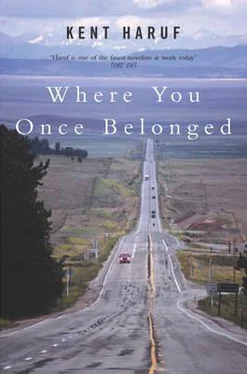Kent Haruf - Where You Once Belonged
Здесь есть возможность читать онлайн «Kent Haruf - Where You Once Belonged» весь текст электронной книги совершенно бесплатно (целиком полную версию без сокращений). В некоторых случаях можно слушать аудио, скачать через торрент в формате fb2 и присутствует краткое содержание. Год выпуска: 2004, Издательство: Pan MacMillan, Жанр: Современная проза, на английском языке. Описание произведения, (предисловие) а так же отзывы посетителей доступны на портале библиотеки ЛибКат.
- Название:Where You Once Belonged
- Автор:
- Издательство:Pan MacMillan
- Жанр:
- Год:2004
- ISBN:нет данных
- Рейтинг книги:5 / 5. Голосов: 1
-
Избранное:Добавить в избранное
- Отзывы:
-
Ваша оценка:
- 100
- 1
- 2
- 3
- 4
- 5
Where You Once Belonged: краткое содержание, описание и аннотация
Предлагаем к чтению аннотацию, описание, краткое содержание или предисловие (зависит от того, что написал сам автор книги «Where You Once Belonged»). Если вы не нашли необходимую информацию о книге — напишите в комментариях, мы постараемся отыскать её.
Where You Once Belonged — читать онлайн бесплатно полную книгу (весь текст) целиком
Ниже представлен текст книги, разбитый по страницам. Система сохранения места последней прочитанной страницы, позволяет с удобством читать онлайн бесплатно книгу «Where You Once Belonged», без необходимости каждый раз заново искать на чём Вы остановились. Поставьте закладку, и сможете в любой момент перейти на страницу, на которой закончили чтение.
Интервал:
Закладка:
But finally Withers accepted this new fact and went on. He said: “All right, then, so you’re married. You married some good-looking girl in Oklahoma. But Jesus Christ, man, didn’t you even go to a single meeting we sent you down there to go to?”
“Sure,” Burdette told him. “I went to some of them. I went to a goodly number. I didn’t meet her till Saturday.”
“Then how come you never come back until Wednesday? You was supposed to report to us here on Tuesday.”
“I remember,” Burdette said. “But you don’t expect them to open that office of theirs on the weekends, do you?”
“What office?”
“The one so we could get our blood tested.”
“You mean you got married on Monday?”
“That’s right.”
“But that still leaves Tuesday.”
“No it don’t.”
Withers stared at him.
“Tuesday was our honeymoon,” Burdette said. “We was still in bed on Tuesday.”
Withers took the toothpick out of his mouth then and threw it away. He said he didn’t have any more use for it now. It didn’t taste good to him.
Nevertheless he went on once more. “All right,” he said, “I guess some kind of congratulations are in order. And I do congratulate you — I wish you both well. Still I’m only going to hope for one thing.”
“What’s that?”
“I’m just going to hope that this doesn’t spoil your good judgment.”
“It never has before.”
“Goddamn it — you haven’t never been married before either.”
“That’s a fact,” Burdette said. “I haven’t even been to Tulsa before. It might get to be a habit.”
Burdette slapped Withers on the back then. But Arch Withers still wasn’t amused. He climbed into his pickup and started it. Through the open window he said: “How was your blood anyway? That report you had. It might be of interest to the board.”
“Arch,” Burdette said, “it was hot. You just wouldn’t believe how hot it was.” He began to laugh. “And hers was too,” he said.
Then Withers drove away, across the gravel out onto the road and over to Main Street to Bradbury’s Bakery. For an hour before going home again, before returning to the tractor waiting for him in the half-plowed field which he admitted he had left for too long already over this damned business, he sat drinking black coffee and eating cream-filled doughnuts while he told some of us what he had just heard. He said he believed that Burdette had stopped laughing as he drove away but that he was pretty sure Burdette was still grinning.
“So,” one of us said. “He’s married now, is he? Well hell’s bells.”
“Except you mean wedding bells, don’t you?” one of the others said.
“No, I don’t. I mean, that son of a bitch. I wonder what she looks like.”
As a result of all this there was a considerable crowd at the Holt Cafe on Main Street that Thursday noon. People in Holt knew Burdette ate lunch there and they hoped that his new wife would join him. They wanted to see this new woman for themselves. They wanted to examine her and confirm their expectations. By twelve o’clock all of the tables and booths at the cafe were occupied and there was an increasing number of people standing up at the front door waiting for the possibility of a vacated table. Meanwhile the special of the day — Swiss steak and potatoes and green beans and hot apple pie — had already been used up.
Then a little after twelve Burdette walked in. He stood just inside the doorway a moment, scanning the tables and booths, looking across the steamy overfilled room for a place to sit. A couple of the local men waved at him, motioning for him to come join them at a center table opposite the salad bar. He acknowledged the men, but then he walked past their table and over to a booth in the corner. There was a young woman sitting in the booth, alone.
She had come in earlier. I believe she had been there for about thirty minutes; maybe more than that. When she had entered the cafe late that morning people had noticed her — anyone new in town would be noticed — but I don’t think they had thought much about it. I suppose they — we — had all assumed that she was just some single woman from out of town who was passing through Holt on Highway 34 and that she had only stopped for lunch and maybe for an hour of rest at the cafe. Still there were people who were annoyed with her too; those men and women who were standing up at the doorway kept glancing at her, indicating by their quick harsh glances that she ought to have the decency to get up and leave. She was occupying an entire booth by herself, a booth which they themselves had more immediate and urgent need of.
Then Burdette did something which surprised everyone in the cafe. He sat down with her — not across from her but beside her — and he put his arm around her. He pulled this new unknown young woman to himself and kissed her.
And suddenly it was as if you could actually hear the insuck of breath from the men and women sitting in the cafe that noon when they realized who she was, when they understood who she had to be. It was like that moment that comes in a movie when everything — music, motion and sense — is stopped for a few seconds and the figures on the screen are held temporarily in silent stasis and arrest. People in Holt felt shocked. She wasn’t anything like what they expected her to be. There were some in the cafe who even wondered if she weren’t part Indian.
For Jessie Burdette, it turned out, was a very quiet and solitary woman. She had brown eyes and dark brown hair and beautifully clear skin, and she was of less than medium height and she was quite slim, but she wasn’t petite. She didn’t make you think of girlish debutantes or of retiring primroses. She wasn’t even pretty really. That is, she was attractive, she was very attractive; and later, thirteen years later, when I came to know her well I thought she was the most attractive woman I’d ever known and absolutely the finest person. And in the end I was ready to do anything at all for her. Still she was not pretty in any conventional sense. She wasn’t at all the positive and cute, sunny little pert-nosed girl next door; nor was she any form of that brash California idea of female pulchritude either. Instead she was rather small and dark and quiet and obviously strong-willed. She seemed capable of a great deal. She seemed independent. Even on that first day, when I saw her for the first time in the Holt Cafe, there seemed to be a quality of aloofness about her, as if she preferred really to be left alone, or as if she knew very well what she wanted and if that happened to preclude being close to others — so that she must always seem a little set off and separate from other people in Holt, or, for that matter, from people anywhere else in the world — she was willing to accept that too.
So I don’t know why she married Jack Burdette. Not absolutely, at any rate. On the other hand, as I’ve suggested before, I think I do know why Burdette married her: out of boredom. He decided that charming Jessie was at least preferable to attending any more convention workshops. Then, too, he had those company charge cards in his pocket. He wouldn’t have wanted to waste an opportunity to spend money which did not belong to him, especially if it was simply a matter of having to scribble his name on a piece of paper. But I can’t say absolutely why Jessie married him.
I suppose part of it had to do with the fact that she was only twenty years old in 1971. She was still very young, although she was not entirely ignorant of the ways of the world and men. She had had some experience of both, some limited experience. But the point is, she was very young even so. She was not much more than a girl yet. Besides, she had lived her entire life in Tulsa. And I don’t think, at twenty, that Jessie Burdette believed that Tulsa was all there was in the world worth seeing.
Читать дальшеИнтервал:
Закладка:
Похожие книги на «Where You Once Belonged»
Представляем Вашему вниманию похожие книги на «Where You Once Belonged» списком для выбора. Мы отобрали схожую по названию и смыслу литературу в надежде предоставить читателям больше вариантов отыскать новые, интересные, ещё непрочитанные произведения.
Обсуждение, отзывы о книге «Where You Once Belonged» и просто собственные мнения читателей. Оставьте ваши комментарии, напишите, что Вы думаете о произведении, его смысле или главных героях. Укажите что конкретно понравилось, а что нет, и почему Вы так считаете.












